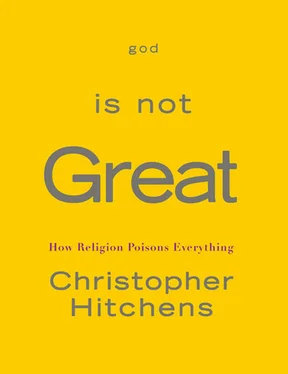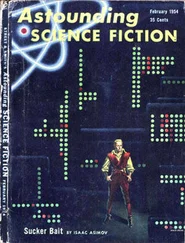WE MUST ALSO CONFRONT the fact that evolution is, as well as smarter than we are, infinitely more callous and cruel, and also capricious. Investigation of the fossil record and the record of molecular biology shows us that approximately 98 percent of all the species that have ever appeared on earth have lapsed into extinction. There have been extraordinary periods of life explosion, invariably succeeded by great “dyings out.” In order for life to take hold at all on a cooling planet, it had first to occur with fantastic profusion. We have a micro-glimpse of this in our little human lives: men produce infinitely more seminal fluid than is required to build a human family, and are tortured—not completely unpleasantly—by the urgent need to spread it all over the place or otherwise get rid of it. (Religions have needlessly added to the torture by condemning various simple means of relieving this presumably “designed” pressure.) The exuberant teeming variety of insect life, or sparrow or salmon or codfish life, is a titanic waste that ensures, in some but not all cases, that there will be enough survivors.
The higher animals are hardly exempt from this process. The religions that we know of have—for self-evident reasons—also emerged from peoples that we know of. And in Asia and the Mediterranean and the Middle East, the human record is traceable back for an impressively long and continuous period of time. However, even the religious myths mention periods of darkness and plague and calamity, when it seemed that nature had turned against human existence. The folk memory, now confirmed by archaeology, makes it seem highly probable that huge inundations occurred when the Black Sea and the Mediterranean were formed, and that these forbidding and terrifying events continued to impress the storytellers of Mesopotamia and elsewhere. Every year, Christian fundamentalists renew their expeditions to Mount Ararat in modern Armenia, convinced that one day they will discover the wreckage of Noah’s Ark. This effort is futile and would prove nothing even if it were successful, but if these people should chance to read the reconstructions of what really did happen, they would find themselves confronted with something far more memorable than the banal account of Noah’s flood: a sudden massive wall of dark water roaring across a thickly populated plain. This “Atlantis” event would have adhered to the prehistoric memory, all right, as indeed it does to ours.
However, we do not even possess a buried or ill-chronicled memory of what happened to most of our fellow humans in the Americas. When the Catholic Christian conquistadores arrived in the Western Hemisphere in the early sixteenth century AD, they behaved with such indiscriminate cruelty and destructiveness that one of their number, Bartolemeo de las Casas, actually proposed a formal renunciation and apology, and an acknowledgment that the whole enterprise had been a mistake. Well-intentioned as he may have been, he based his bad conscience on the idea that the “Indians” had been living in an undisturbed Eden, and that Spain and Portugal had missed their chance of rediscovering the innocence that had pre-dated the fall of Adam and Eve. This was wishful piffle and also extreme condescension: the Olmec and other tribes had gods of their own—mainly propitiated by human sacrifice—and had also developed elaborate systems of writing, astronomy, agriculture, and trade. They wrote down their history and had discovered a 365-day calendar that was more accurate than its European counterparts. One particular society—the Mayan—had also managed to come up with that beautiful concept of zero to which I alluded earlier, and without which mathematical computation is very difficult. It may be significant that the papacy of the Middle Ages always resisted the idea of “zero” as alien and heretical, perhaps because of its supposedly Arab (in fact Sanskrit) origin but perhaps also because it contained a frightening possibility.
Something is known of the civilizations of the American isthmus, but until very recently we were unaware of the vast cities and networks that once stretched across the Amazon basin and some regions of the Andes. Serious work has only just begun on the study of these impressive societies, which grew and flourished when Moses and Abraham and Jesus and Muhammad and Buddha were being revered, but which took no part at all in those arguments and were not included in the calculations of the monotheistic faithful. It is a certainty that these people, too, had their creation myths and their revelations of the divine will, for all the good it did them. But they suffered and triumphed and expired without ever being in “our” prayers. And they died out in the bitter awareness that there would be nobody to remember them as they had been, or even as if they had been. All their “promised lands” and prophecies and cherished legends and ceremonies might as well have occurred on another planet. This is how arbitrary human history actually is.
There seems to be little or no doubt that these peoples were annihilated not just by human conquerors but by microorganisms of which neither they nor their invaders had any knowledge. These germs may have been indigenous or they may have been imported, but the effect was the same. Here again one sees the gigantic man-made fallacy that informs our “Genesis” story. How can it be proven in one paragraph that this book was written by ignorant men and not by any god? Because man is given “dominion” over all beasts, fowl and fish. But no dinosaurs or plesiosaurs or pterodactyls are specified, because the authors did not know of their existence, let alone of their supposedly special and immediate creation. Nor are any marsupials mentioned, because Australia—the next candidate after Mesoamerica for a new “Eden”—was not on any known map. Most important, in Genesis man is not awarded dominion over germs and bacteria because the existence of these necessary yet dangerous fellow creatures was not known or understood. And if it had been known or understood, it would at once have become apparent that these forms of life had “dominion” over us , and would continue to enjoy it uncontested until the priests had been elbowed aside and medical research at last given an opportunity. Even today, the balance between Homo sapiens and Louis Pasteur’s “invisible army” of microbes is by no means decided, but DNA has at least enabled us to sequence the genome of our lethal rivals, like the avian flu virus, and to elucidate what we have in common.
Probably the most daunting task that we face, as partly rational animals with adrenal glands that are too big and prefrontal lobes that are too small, is the contemplation of our own relative weight in the scheme of things. Our place in the cosmos is so unimaginably small that we cannot, with our miserly endowment of cranial matter, contemplate it for long at all. No less difficult is the realization that we may also be quite random as presences on earth. We may have learned about our modest position on the scale, about how to prolong our lives, cure ourselves of disease, learn to respect and profit from other tribes and other animals, and employ rockets and satellites for ease of communication; but then, the awareness that our death is coming and will be succeeded by the death of the species and the heat death of the universe is scant comfort. Still, at least we are not in the position of those humans who died without ever having the chance to tell their story, or who are dying today at this moment after a few bare, squirming minutes of painful and fearful existence.
In 1909, a discovery of immense importance was made in the Canadian Rockies, on the border of British Columbia. It is known as the Burgess shale, and though it is a natural formation and has no magical properties, it is almost like a time machine or a key that enables us to visit the past. The very remote past: this limestone quarry came into existence about 570 million years ago and records what palaeontologists familiarly call “the Cambrian explosion.” Just as there have been great “ dyings” and extinctions during evolutionary time, so there have been energetic moments when life was suddenly profuse and various again. (An intelligent “designer” might have managed without these chaotic episodes of boom and bust.)
Читать дальше












